Pilot project for psychosocial support in intensive care medicine starts practical test
Measures to relieve staff, patients and relatives in a total of eight intensive care units are being trialled at three university hospitals.
In intensive care units, staff as well as patients and their relatives are exposed to high levels of mental stress and are particularly at risk of developing psychological complaints or illnesses. In order to improve psychosocial care in these challenging situations, the research project ‘IPS Pilot - Integrated Psychosocial Care in Intensive Care Medicine’ is now investigating specific measures in practice. In eight intensive care units at three university hospitals in Germany, including Magdeburg University Hospital, targeted psychological support services for staff and patients are being trialled. The aim is to provide substantial support for staff in intensive care units and to improve the psychosocial care of patients and their relatives in the long term.
A central component of the programme is the integration of a psychologist into the ward team. This psychologist supports the respective intensive care team in their demanding day-to-day work and offers targeted support for patients and their relatives. This includes training to strengthen mental resilience and develop coping and stress reduction strategies.
"The project is an important step towards protecting our staff in intensive care units from the high levels of psychological stress and keeping them healthy in the long term. At the same time, we give patients more security and support relatives so that they can draw strength and be patient in difficult times. In this way, we are making an important contribution to stable patient care,’ emphasises Kerstin Schütt, Head of Nursing at Intensive Care Unit 2 at the University Clinic for Anaesthesiology and Intensive Therapy in Magdeburg.

Photo: As part of the ‘IPS-Pilot’ pilot project, new approaches to psychosocial support in intensive care units are currently being trialled at Magdeburg University Hospital. A team from the fields of intensive care medicine, nursing, psychosomatics and health systems research is working hand in hand to strengthen the mental health of staff, patients and relatives in a targeted manner. Photographer: Sarah Kossmann/University Medicine Magdeburg
This needs-orientated concept was developed on the basis of a systematic analysis of existing studies and surveys of all groups involved. If the feasibility of these measures is confirmed, an effectiveness study will follow to analyse the extent to which the planned measures can reduce mental stress.
The project is being funded with around 1.4 million euros by the Innovation Committee of the Federal Joint Committee (G-BA) and is being carried out under the leadership of Ulm University Medical Centre in collaboration with the University Clinic for Psychosomatic Medicine and Psychotherapy Magdeburg, the Institute for Social Medicine and Health Systems Research at Otto von Guericke University Magdeburg and Charité - Universitätsmedizin Berlin .
Contact person for the project
Dr Marius Binneböse, Specialist in Psychosomatic Medicine and Psychotherapy, University Clinic for Psychosomatic Medicine and Psychotherapy Magdeburg, e-mail: marius.binneboese@med.ovgu.de
Project management
Prof. Dr Florian Junne, Director of the University Clinic for Psychosomatic Medicine and Psychotherapy at Otto von Guericke University Magdeburg, Tel.: 0391/67-14200, e-mail: kpsm@med.ovgu.de
Prof. Dr Dr Christian Apfelbacher, Director of the Institute for Social Medicine and Health Systems Research at Otto von Guericke University Magdeburg, Tel.: 0391-67-24322, e-mail: christian.apfelbacher@med.ovgu.de






